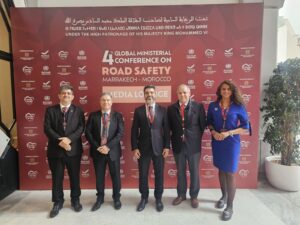
Exploring the Future of Mobility Education: Insights from the 19th National Traffic Council Forum
The intersection between education, management and mobility plays a central role in discussions about urban development and quality of life in cities. Recently, during a significant meeting at the headquarters of the State Traffic Council of Goiás, which took place on May 23, 2024, prominent figures from the sector came together to debate these vital issues. This meeting precedes the XIX National Forum of Traffic Councils (FOCOTRAN), an event that serves as a platform for in-depth discussions and the formulation of effective policies.
Therefore, the meeting was attended by renowned experts, including Dr. Humberto Kennedy, Vice-President of the Automóvel Clube Brasileiro (FIA Member), Kleber Denis Pinto, Director of Faspec, and Horácio Ferreira, advisor and agent of SMM/ GO. They joined Dr. Nayara Coimbra, President of CETRAN/GO, for an exchange of ideas that promises to significantly impact future initiatives in education and mobility.
During the meeting, the crucial role of institutions such as FIA, ACBr, Faspec and SMM in municipal management was emphasized, highlighting the importance of collaboration between different entities for the advancement of cities. Furthermore, proposals were presented that aim not only at formal education, but also at developing skills that prepare citizens for efficient management of traffic and urban mobility.
The discussion was not limited to technical and administrative aspects; also addressed the transformative role of education in urban mobility. The integration between education and traffic management is seen as fundamental to developing a more conscious and responsible society. In this sense, Faspec, known for its innovation in distance education, has a relevant role, offering courses that prepare professionals to face and manage the contemporary challenges of urban mobility.


Furthermore, experts highlighted the need for policies that encourage research and implementation of innovative solutions to mobility problems. Such policies should ideally combine technology and education, ensuring that technological advances are accessible and beneficial to all sectors of society.
The event was also an opportunity to reaffirm international commitments, considering mobility a topic of global interest. Active participation in forums such as FOCOTRAN is essential for Brazil to not only follow, but also contribute to the global debate on traffic and mobility management.
In conclusion, the pre-FOCOTRAN meeting was an enriching prelude to what we hope will be a productive and revealing forum. The involvement of educational and management institutions in the dialogue on urban mobility is not only necessary, but also essential for building smarter and more inclusive cities. As these discussions continue and their conclusions are implemented, we can look forward to a future where mobility education plays a key role in the sustainable development of our urban centers.








